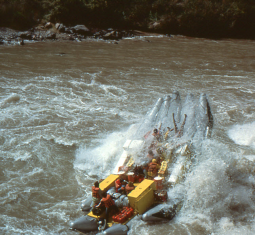
In college I had the opportunity to work as a river guide running the rapids in the Grand Canyon. Later on I discovered that navigating challenging rapids was akin to the terror often experienced in holding challenging conversations. Unfortunately, when it comes to talking about potentially difficult topics, we usually engage in what we call “fake talk” whether intentionally or unintentionally. Fake talk is any conversation where we think we have handled a potentially difficult topic only to find out later, when we didn’t get results, that our conversation was ineffective.
Whether running a serious rapid or holding a difficult conversation, there are five tips that will help anyone to be more successful:
Be prepared. In large rapids it is advisable to stop above the rapid and “scout” the rapid. In difficult conversations, it is important to take some time and think about the current situation. Good conversationalists take time to identify what they want as an outcome for the conversation. They think about the person in the situation, identify the facts of the past, how the person usually responses to feedback, what they are assuming about the person and the situation, and how they might best begin the conversation. Taking a moment to prepare insures that the conversation will go better than thinking that you can just “wing it” and achieve results.
Be aware. An effective river runner learns to “read the river” and use the dynamics of the water to their advantage. Being aware of the dynamics that are present in any conversation is the key to managing those dynamics. Often people are not aware of what is happening in a conversation until it is too late. This is especially true when it comes to dealing with negative emotional reaction. Recognizing when tempers start to flare is important in defusing emerging emotion and keeping the conversation on a rational track. You must notice the conversation’s dynamics and manage them.
Be deliberate. When running a rapid, you should decide beforehand the path to take and then you execute a maneuver along that path. Good communicators have a clear process for holding the conversation that ends in creating accountability or a change in behavior. That is the reason you hold the difficult conversations in the first place—you want something to change. You have to be deliberate about the course you will take and where you desire to end up if you ever hope to get where you want to go.
Be curious. Working in the bottom of the Grand Canyon for 13 years, I learned many things about the natural world that were totally outside the perception of my normal everyday life. I found it helpful to notice what I didn’t know and to pose questions in an attempt to increase my understanding of this new world. In conversation, we often make assumptions about people and situations which are incomplete or inaccurate. In conversation you need to understand what you know and what you don’t know. This requires that you ask questions either to confirm what you know or to learn what you don’t know. Either way, asking questions helps to increase your understanding and to assess the accuracy of your thinking.
Be attentive. In the middle of any rapid things can change instantaneously and dramatically. Being in the middle of a dynamic moment requires that you pay attention to what is happening, so that when the dynamics change you can adapt to those changing dynamics immediately. In conversation we often listen with our ears, but we don’t attend to the messages that are being sent beyond the words that are spoken. Being attentive allows us to capture all the messages that are being sent and respond to them by asking questions to understand what is being communicated. Often the unspoken messages are more important than what is actually said. People may say “yes” with their words when the nonverbal message screams “NO!” You have to notice these messages if you are going to understand how they may impact your results.
These simple five tips will help you to navigate the perils that difficult conversations often present. If you can take a moment to prepare, be aware of what is happening in the moment, be deliberate in what you want to create as an outcome, be curious about what others are thinking, and be attentive to the messages that are offered, you are sure to improve your results. You can navigate the “whitewater” of difficult conversations rather than running the risk of engaging in fake talk that leads to navigating that “rapid” again.